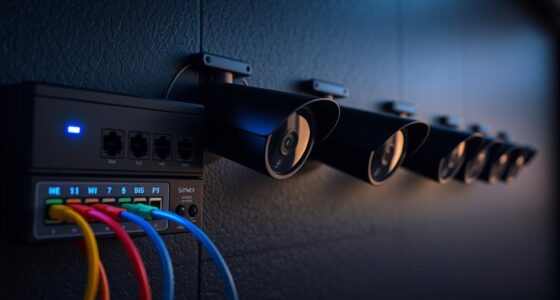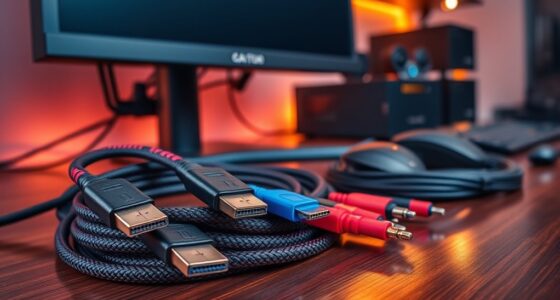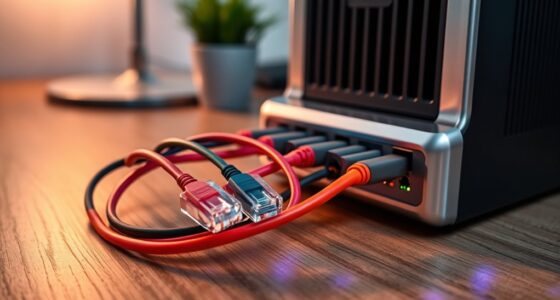As a gamer, understanding network latency and bandwidth is key to ideal play. Latency is the delay between your actions and their response on the game server; low latency keeps gameplay smooth, while high latency causes lag. Bandwidth is how much data your internet can handle at once—more bandwidth means better streaming and fewer pauses. Balancing both factors improves your experience, and exploring further will help you fine-tune your connection for victory.
Key Takeaways
- Network latency is the time it takes for data to travel between your device and the game server, affecting response speed.
- Bandwidth determines how much data your internet connection can handle simultaneously, impacting game data flow.
- High latency causes delays and lag, making gameplay feel sluggish or unresponsive.
- Insufficient bandwidth leads to buffering, reduced video quality, and increased lag during online gaming.
- Stable servers, low latency, and adequate bandwidth are essential for smooth, responsive gaming experiences.

Have you ever wondered why your internet slows down during video calls or online gaming? It often comes down to factors like network latency and bandwidth, which directly influence your online experience. When you’re gaming or on a video call, your device communicates with a server somewhere on the internet. If that server isn’t stable—meaning it has issues with server stability—it can cause delays, lag, or disconnections. A stable server ensures that data packets travel smoothly back and forth without interruption, which is vital for maintaining a seamless connection. But even if the server is stable, packet loss can still disrupt your experience. Packet loss occurs when some of the data packets sent between your device and the server don’t reach their destination. When this happens, it’s like trying to have a conversation where some words get lost; the result is choppy audio, laggy visuals, or sudden freezes in your game.
Understanding how server stability and packet loss affect your connection helps you diagnose issues more accurately. If your game suddenly lags or your video call drops or becomes blurry, it might be due to packet loss, which is often caused by network congestion, faulty hardware, or poor internet service. These problems increase latency, the time it takes for data to travel from your device to the server and back. High latency results in noticeable delays—your actions in the game might register a second later, or your voice might be out of sync during a call. This delay can make competitive gaming frustrating because you’re always reacting to a slightly outdated version of the game state. Additionally, network congestion can cause temporary spikes in latency, further impacting your experience.
Bandwidth also plays a role here. It’s the amount of data your internet connection can handle at once. If your bandwidth is limited, streaming high-quality video or playing fast-paced games becomes challenging because there isn’t enough room to transmit all the necessary data quickly. When bandwidth is constrained, it can lead to buffer bloat, where data queues up and causes further latency. To improve your gaming or streaming experience, you need a balance: a stable connection with low latency, minimal packet loss, and sufficient bandwidth. Upgrading your internet plan, using wired connections instead of Wi-Fi, or optimizing your network setup can all make a significant difference.
Frequently Asked Questions
How Does Server Location Affect Gaming Performance?
Server location considerably impacts your gaming performance through server proximity, which directly affects your ping. When the server is closer, your connection experiences lower latency, resulting in quicker response times. To optimize your gaming experience, choose servers that are geographically near you for better ping and reduced lag. This ping optimization helps you react faster, giving you an edge in competitive gameplay and ensuring smoother, more responsive gaming sessions.
Can VPNS Improve or Worsen Network Latency?
VPNs can both improve or worsen your network latency, depending on how you use them. If you choose a VPN server close to your game server, VPN encryption may reduce latency, boosting your gaming experience. However, selecting a distant VPN server or poor VPN service can increase latency, causing lag. Always pick a VPN server wisely, and remember that some VPNs may add extra encryption overhead, slowing your connection.
What Devices Can Help Reduce Latency During Gaming?
You can reduce latency during gaming by using devices like a high-quality router optimized for gaming. Look for routers with QoS (Quality of Service) settings, which prioritize gaming traffic. Gaming accessories such as Ethernet adapters and signal boosters also help guarantee a stable, fast connection. These devices work together to minimize lag, giving you smoother gameplay and a better overall experience.
How Do Background Apps Impact Bandwidth During Gameplay?
Did you know background app interference can cut your bandwidth by up to 50%? When you run multiple apps during gaming, they often engage in bandwidth throttling, reducing the data available for your game. This slows down your connection, causes lag, and worsens your overall experience. To keep your gameplay smooth, close unnecessary background apps and monitor your network activity to prevent bandwidth throttling from affecting your game.
Is Wired or Wireless Connection Better for Minimal Latency?
A wired Ethernet connection is better for minimal latency because it offers greater stability and consistent speeds, reducing ping spikes. Wi-Fi, on the other hand, can suffer from interference from other devices and obstacles, causing lag and higher latency. To guarantee smooth gameplay, opt for a wired Ethernet connection whenever possible, especially if you’re in an environment with Wi-Fi interference, as it provides a more reliable and low-latency experience.
Conclusion
Understanding network latency and bandwidth is like mastering the gears of a finely tuned engine—your gaming experience depends on it. When you grasp how these elements work together, you’ll dodge lag and enjoy smoother gameplay. Think of your network as the highway; a clear, fast lane means your actions reach the game world instantly. By tuning your connection, you’re steering yourself toward victory, turning frustration into a well-oiled machine ready to conquer any virtual battleground.







